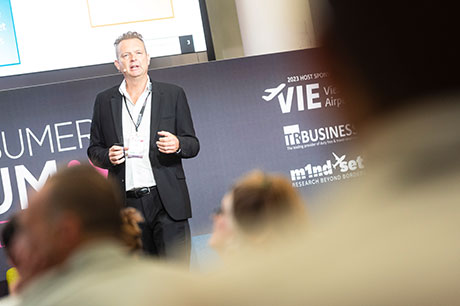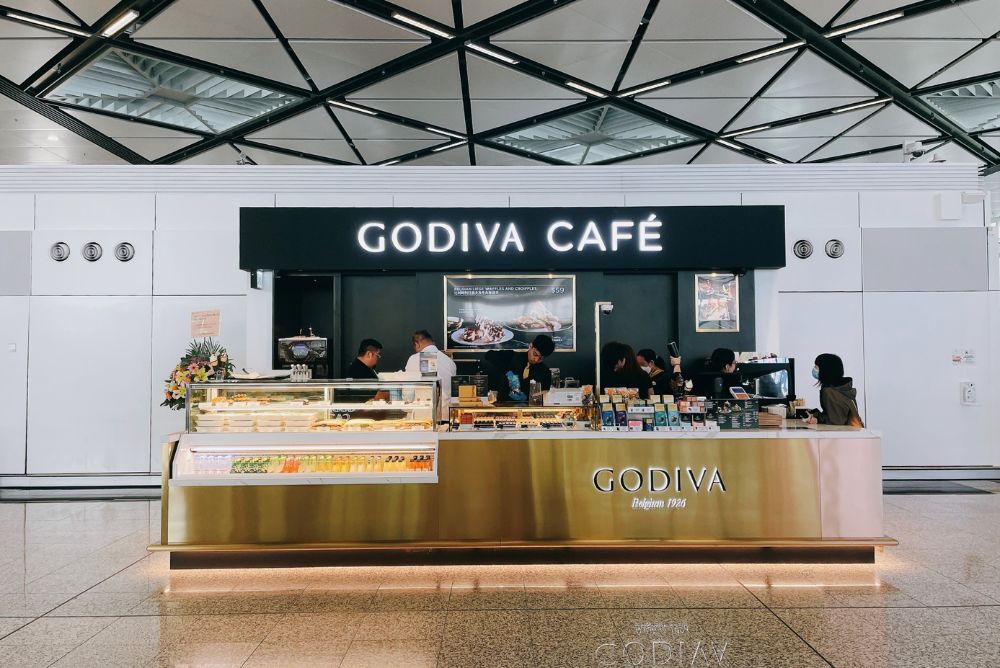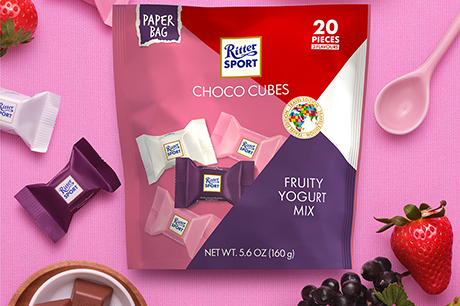Men buy and spend more in travel retail says new research by m1nd-set
By Faye Bartle |

Dr. Peter Mohn, Owner and CEO at m1nd-set at the 2023 TR Consumer Forum.
Men have a higher conversion rate and spend more when shopping in travel retail, says new research from m1nd-set.
The insights, which drill down on the differences in shopping habits of men versus women in the channel, shows that 45% of men entered duty free shops in 2023 compared to 44% of women. Furthermore, 29% of men purchased one or more products in the shops compared to 26% of women purchased.
The data from the Swiss research agency shows a conversion rate of 64% for men – that’s five points higher than the conversion rate among women.
In terms of spend, men also spent more on average in total in 2023 at $148 vs, $137.
However, spend levels in total are lower than the pre-pandemic levels of $166 for men and $155 for women, reveals the research.

Source: m1nd-set.
The study, which was conducted among more than 10,000 shoppers across all world regions, highlights the areas where shopping behaviour differs significantly between men and women to provide detail insights on a number of key dynamics from footfall to conversion and spend, as well as categories purchased and barriers to purchase, plus much more.
The major differences in shopping behaviour across the categories occur in the core beauty, food & confectionery, alcohol and tobacco categories.
“It comes as no surprise that women purchase beauty significantly more than men; 48% of women purchased either skincare, perfumes or make-up compared to 32% of men,” explained Dr. Peter Mohn, Owner and CEO at m1nd-set.
“The percentage of men purchasing beauty in 2023 has fallen since before the pandemic, however, by 5%.
“We see the same tendency in the food & confectionery category, as 40% of women say they purchased the category in airports in 2023 while only 34% of men purchased the category.
“Categories that are more frequently purchased by men include alcohol and tobacco.”

Source: m1nd-set.
Some behaviours in travel retail fall more in line with general high street shopping behaviour, according to m1nd-set.
For instance, a higher percentage of men say that they are attracted to the duty free shops by the convenience factor.
Men are also more prone to be lured by the more advantageous prices in duty free than women, but say they are less stimulated by the opportunity to kill time and browse around the stores.
Unpacking the share of wallet
The research also digs into the key differences between men and women in terms of share of wallet in travel retail, with the most significant contrasts being observed in the beauty category as indicated above.
Men dedicate a significantly higher proportion of their spend to alcohol purchases than women. Similarly, jewellery & watches commands a notably higher proportion of men’s wallets than that of women, says the data.
Diverging trends when analysing purchase destination are also noted, with a higher percentage of women purchasing beauty for their own consumption than men.
The same trend is observed in the food & confectionery category, although the opposite is seen in alcohol and tobacco; men tend to purchase both these categories for their own consumption more than women.

Source: m1nd-set.
Other notable differences in behaviour between men and women are seen in the gift purchasing behaviour for the travel accessories and toys categories, both of which are purchased more frequently by men than women as gifts. Women, however, are more solicited than men to purchase both tobacco and toys by friends and family.
Tracking staff engagement
The research also demonstrates that men are more likely than women to engage with the sales staff in duty free stores. The tendency to engage has risen from the pre- to post-pandemic era among men, while the opposite trend can be seen among female shoppers.
Men are also more prone to be influenced by the interaction with the sales associates than women.
“The main barrier to purchase for both men and women equally is the negative price perception as 50% of both men and women said that the lack of motivating promotions and higher prices than in their home market were the main reasons for not purchasing in the duty free shops,” said Mohn.
“The product assortment and lack of new products is the second most common reason for not purchasing, by both men and women,
“A regular rotation of the product mix and a renewal of the product range to offer newness is therefore advisable to entice browsers to purchase instore.
“Clearer communications, either through instore touch points and POS signage as well as through the well-trained staff is also advisable to remove another barrier to purchasing, namely the uncertainty about customs regulations and allowances, which is cited by one quarter of both men and women.
“Customs allowances should be made blatantly clear across all touch points, as this is a barrier that can be easily removed.”
READ MORE: TR Consumer Forum 2024: Ticket sales now open
READ MORE: Indian shoppers more likely to engage with retail staff on trips, research shows
READ MORE: Beauty tops Chinese passenger shopping lists in 2024: m1nd-set
Alcohol insights: Conversion up, spend down in Q4
Conversion of visitors in the alcohol category in duty free has risen to 54% in Q4 2023,...
Men buy and spend more in travel retail says new research by m1nd-set
Men have a higher conversion rate and spend more when shopping in travel retail, says new...
Saudia Arabia's KKIA unfurls T3 duty free expansion
King Khalid International Airport (KKIA) has unveiled the first stage of its much-vaunted duty...
-
 International,
International,Alcohol insights: Conversion up, spend down in Q4
-

-
 International,
International,Saudia Arabia's KKIA unfurls T3 duty free expansion

In the Magazine
TRBusiness Magazine is free to access. Read the latest issue now.

 Trbusiness. The travel retail Trbusiness. The magazine for global retail and duty free professionals.
Trbusiness. The travel retail Trbusiness. The magazine for global retail and duty free professionals.




















